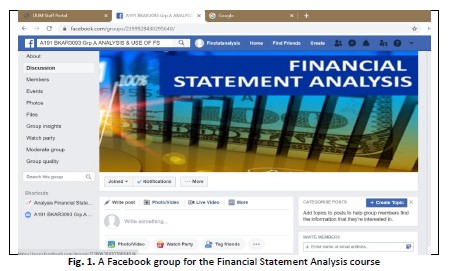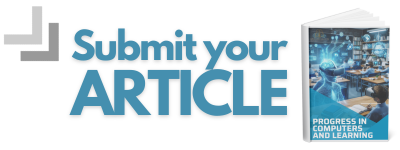Facebook as a Pedagogical Tool in Fostering Students’ Critical Thinking Skills
DOI:
https://doi.org/10.37934/picl.3.1.19Keywords:
Critical thinking skills, educational tool, Facebook, higher education, social networking sitesAbstract
This study examines whether the implementation of Facebook as a pedagogical tool enhances critical thinking skills among final year accounting students who enrolled in financial statement analysis course. A Facebook group was set up and students were encouraged students to use the Facebook group as a platform to discuss and share resources relating to their group project. The critical thinking skills is analysed based on students’ achievement in addressing the group project, which is assessed using a rubric for critical thinking skills. The study finds that the use of the Facebook group fosters critical thinking skills among students with the Facebook group (the experimental group) as compared to students without the Facebook group (the control group). These findings are noteworthy since final year accounting students are struggling with critical thinking skills, yet it is an essential skill for accounting professionals. The results of this study is hoped to encourage educators in the digital age to make use of social media as a technology-enhanced learning environment for the benefits of students.
Downloads
References
[1] Ainin, Sulaiman, M. Muzamil Naqshbandi, Sedigheh Moghavvemi, and Noor Ismawati Jaafar. "Facebook usage, socialization and academic performance." Computers & Education 83 (2015): 64-73. https://doi.org/10.1016/j.compedu.2014.12.018 DOI: https://doi.org/10.1016/j.compedu.2014.12.018
[2] American Institute of Certified Public Accountants (AICPA). (1999). Broad business perspective competencies.
[3] Astin, A. W. (1984). Student involvement: A developmental theory for higher education. Journal of College Student Personnel, 25, 297-308.
[4] Malecela, Issa Omar. "Integrating computer-related technology into instructional practice at a higher learning institution in Malaysia." IIUM Journal of Educational Studies 5, no. 1 (2017): 76-92. https://doi.org/10.31436/ijes.v5i1.152 DOI: https://doi.org/10.31436/ijes.v5i1.152
[5] Busalim, Abdelsalam H., Maslin Masrom, and Wan Normeza Binti Wan Zakaria. "The impact of Facebook addiction and self-esteem on students’ academic performance: A multi-group analysis." Computers & Education 142 (2019): 103651. https://doi.org/10.1016/j.compedu.2019.103651 DOI: https://doi.org/10.1016/j.compedu.2019.103651
[6] Datu, Jesus Alfonso D., Weipeng Yang, Jana Patricia M. Valdez, and Samuel Kai Wah Chu. "Is facebook involvement associated with academic engagement among Filipino university students? A cross-sectional study." Computers & Education 125 (2018): 246-253. https://doi.org/10.1016/j.compedu.2018.06.010 DOI: https://doi.org/10.1016/j.compedu.2018.06.010
[7] Demir, Mehmet. "Developing a scale for using Facebook as a learning tool." Educational Technology Research and Development 66, no. 6 (2018): 1457-1477. https://doi.org/10.1007/s11423-018-9616-8 DOI: https://doi.org/10.1007/s11423-018-9616-8
[8] DeWaelsche, Scott A. "Critical thinking, questioning and student engagement in Korean university English courses." Linguistics and Education 32 (2015): 131-147. https://doi.org/10.1016/j.linged.2015.10.003 DOI: https://doi.org/10.1016/j.linged.2015.10.003
[9] Disparte, D. (2018). Facebook and the tyranny of monthly active users. Forbes.
[10] Dyson, Benjamin, Kristin Vickers, John Turtle, Sara Cowan, and Adrianna Tassone. "Evaluating the use of Facebook to increase student engagement and understanding in lecture-based classes." Higher Education 69 (2015): 303-313. https://doi.org/10.1007/s10734-014-9776-3 DOI: https://doi.org/10.1007/s10734-014-9776-3
[11] Efendioğlu, Akın. "Teachers’ use of Facebook and teacher quality: developing a ‘Facebook Effect Scale on Teacher Quality (FESTQ)’from the perspective of PCK, TPACK, and lifelong learning frameworks." Educational Technology Research and Development 66, no. 6 (2018): 1359-1385. https://doi.org/10.1007/s11423-018-9586-x DOI: https://doi.org/10.1007/s11423-018-9586-x
[12] Feng, Shihui, Yip Kan Wong, Lai Yin Wong, and Liaquat Hossain. "The Internet and Facebook usage on academic distraction of college students." Computers & Education 134 (2019): 41-49. https://doi.org/10.1016/j.compedu.2019.02.005 DOI: https://doi.org/10.1016/j.compedu.2019.02.005
[13] Fredricks, Jennifer A., Phyllis C. Blumenfeld, and Alison H. Paris. "School engagement: Potential of the concept, state of the evidence." Review of educational research 74, no. 1 (2004): 59-109. https://doi.org/10.3102/00346543074001059 DOI: https://doi.org/10.3102/00346543074001059
[14] Huff, Patricia Lee. "The goal project: A group assignment to encourage creative thinking, leadership abilities and communication skills." Accounting Education 23, no. 6 (2014): 582-594. https://doi.org/10.1080/09639284.2014.974198 DOI: https://doi.org/10.1080/09639284.2014.974198
[15] Huffman, K., Vernoy, M., Williams, B., and Vernoy, J. (1991). Psychology in action. New York: Wiley.
[16] Junco, Reynol. "The relationship between frequency of Facebook use, participation in Facebook activities, and student engagement." Computers & education 58, no. 1 (2012): 162-171. https://doi.org/10.1016/j.compedu.2011.08.004 DOI: https://doi.org/10.1016/j.compedu.2011.08.004
[17] Kern, Beth B. "Structuring financial statement analysis projects to enhance critical thinking skills development." Journal of accounting education 18, no. 4 (2000): 341-353. https://doi.org/10.1016/S0748-5751(01)00005-7 DOI: https://doi.org/10.1016/S0748-5751(01)00005-7
[18] Kimmel, Paul. "A framework for incorporating critical thinking into accounting education." Journal of accounting education 13, no. 3 (1995): 299-318. https://doi.org/10.1016/0748-5751(95)00012-B DOI: https://doi.org/10.1016/0748-5751(95)00012-B
[19] Kurfiss, Joanne Gainen. Critical Thinking: Theory, Research, Practice, and Possibilities. ASHE-ERIC Higher Education Report No. 2, 1988. ASHE-ERIC Higher Education Reports, The George Washington University, One Dupont Circle, Suite 630, Dept. RC, Washington, DC 20036-1183, 1988.
[20] Leary, Mark R., and Robin M. Kowalski. "The interaction anxiousness scale: Construct and criterion-related validity." Journal of personality assessment 61, no. 1 (1993): 136-146. https://doi.org/10.1207/s15327752jpa6101_10 DOI: https://doi.org/10.1207/s15327752jpa6101_10
[21] Malaysian Qualifications Agency (MQA) (2014). Programme standards: Business studies.
[22] Mazman, Sacide Güzin, and Yasemin Koçak Usluel. "Modeling educational usage of Facebook." Computers & Education 55, no. 2 (2010): 444-453. https://doi.org/10.1016/j.compedu.2010.02.008 DOI: https://doi.org/10.1016/j.compedu.2010.02.008
[23] McEwan, Bree. "Hybrid engagement: How Facebook helps and hinders students’ social integration." In Higher education administration with social media, vol. 2, pp. 3-23. Emerald Group Publishing Limited, 2011. DOI: https://doi.org/10.1108/S2044-9968(2011)0000002004
[24] Ministry of Education Malaysia. (2013). Malaysia Education Blueprint 2013 - 2025. Putrajaya: Kementerian Pendidikan Malaysia.
[25] Sánchez, R. Arteaga, Virginia Cortijo, and Uzma Javed. "Students' perceptions of Facebook for academic purposes." Computers & Education 70 (2014): 138-149. https://doi.org/10.1016/j.compedu.2013.08.012 DOI: https://doi.org/10.1016/j.compedu.2013.08.012
[26] Schindler, Laura A., Gary J. Burkholder, Osama A. Morad, and Craig Marsh. "Computer-based technology and student engagement: a critical review of the literature." International journal of educational technology in higher education 14 (2017): 1-28. https://doi.org/10.1186/s41239-017-0063-0 DOI: https://doi.org/10.1186/s41239-017-0063-0
[27] Statista. (2020). Most popular social networks worldwide as of July 2020, ranked by number of active users.
[28] Tonge, Richard, and Caroline Willett. "Learning to think: Using coursework to develop higher-order academic and practitioner skills among final year accounting students." Accounting Education 18, no. 2 (2009): 207-226. https://doi.org/10.1080/09639280802436947 DOI: https://doi.org/10.1080/09639280802436947
[29] Williams, D. Z. (1993). Reforming accounting education. Journal of Accountancy, 176(2), 76–81.
[30] Young, Marilyn, and D. Lee Warren. "Encouraging the development of critical thinking skills in the introductory accounting courses using the challenge problem approach." Issues in Accounting Education 26, no. 4 (2011): 859-881. https://doi.org/10.2308/iace-50065 DOI: https://doi.org/10.2308/iace-50065
[31] Zulkefli, A. S. (2017). Education Ministry's Padu optimistic 2018 Budget will accelerate education transformation.















